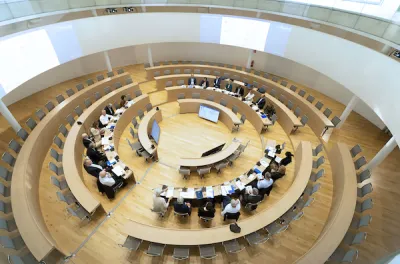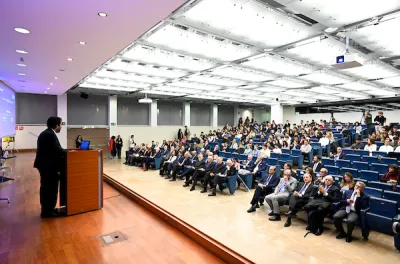Organization
As a university that strongly values its independence and freedom from any external political or economic power, Bocconi has taken on the patrimonial and moral legacy of its founders. It is an accredited, non-profit, private university, which acts for exclusive purposes of social utility.
Bocconi University’s organization and governance system are based on two documents: the Statute and the General University Rules. These documents are updated over time according to regulatory, strategic and governance developments, and always in line with the University’s specific characteristics.
Istituto Javotte Bocconi guarantees Bocconi University's independence. It appoints the President and the majority of the University Board members, including the faculty representative and the student representative. The University's main stakeholders at both national and local levels are also represented on the University Board.
The University Board has the broadest powers of ordinary and extraordinary administration. It establishes the University’s general direction and development program, including through the approval of a strategic plan, as well as the financial statements and budget. The process of monitoring and reviewing the strategic plan is overseen by the Planning and Liaison Committee every three years.
The members of the leadership in the Bocconi governance, each of whom has distinct responsibilities, include:
- the President, whose role is to ensure compliance with the institutional purposes and general principles set out in this Statute;
- The Rector, who performs strategic, coordination and control functions of teaching and research activities and is the academic representative of the University;
- the Managing Director, who is responsible for the University’s administrative governance and guarantees finances and assets are managed correctly and sustainably, performing the functions assigned by the University Board and the President of the University.
Pursuant to the Statute and the General University Rules, the governance system also includes the assemblies and advisory bodies: i.e. the International Advisory Council, the Faculty Council, the Student Representative Council, the Faculty Committee, the Research Committee/Research Center Directors, the Equal Opportunities Committee, the Fundraising Steering Committee and the Student Ombudsperson; the evaluation and monitoring bodies: i.e. the Board of Statutory Auditors (whose members also participate in all meetings of the University Board) and the University Evaluation Unit (an autonomous and independent body that verifies the quality and effectiveness of the educational offer, research and third mission, as well as the effectiveness and efficiency of support services); in addition to the teaching and research bodies: i.e. the Schools, Departments and Research Centers.
Educational activities are carried out by the following Schools:
In addition, the SDA Bocconi School of Management offers post-experience programs, including MBAs, Specialized Executive Master programs and Executive courses.
The university's organizational model also divides the areas of research into nine Departments:
- Accounting
- Computing Sciences
- Economics
- Finance
- Management & Technology
- Marketing
- Decision Sciences
- Legal Studies
- Social and Political Sciences
Research is also carried out within the University’s Research Centers:
- Baffi - Centre on Economics, Finance and Regulation
- BIDSA - Bocconi Institute for Data Science and Analytics
- CERGAS - Centre for Research on Health and Social Care Management
- Dondena - Centre for Research on Social Dynamics and Public Policy
- GREEN - Centre for Research on Geography, Resources, Environment, Energy & Networks
- ICRIOS - Invernizzi Center for Research on Innovation, Organization, Strategy and Entrepreneurship
- IGIER - Innocenzo Gasparini Institute for Economic Research






